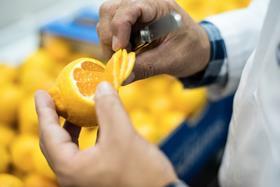
For more than 90 years South Africa’s PPECB has served the South African fresh produce industry with distinction. Amidst the challenges presented by the Covid-19 pandemic, the organisation is once again proving to be a vital link in keeping exports going.
The country's fresh produce industry and the organisation responsible for product quality inspections and product protocols, as well as cool chain management, have been declared essential services during the current lockdown.
PPECB plays a particularly important role. Aside from its duty in the ports, it touches the lives of fruit growers and exporters from the northern borders to the south at the Cape, and from east to the west.
A motivated team of product standard inspectors are located at all packhouses across the country and the PPECB stamp of approval on cartons and on documents provides assurance that all quality, fruit protocol and food safety standards required by importing countries are met.
“Notwithstanding the global lockdown, the movement of product remains essential,” said Lucien Jansen, chief executive of PPECB. “This is even more the case with fresh produce. Importing countries expect that phytosanitary and quality requirements must still be adhered to. The same goes for special shipment protocols.
“As a National Public entity, the PPECB delivers inspection, cold chain and food safety services to the perishable export industry,” Jansen continued. “The PPECB delivers these services to about 1,500 activity points across South Africa. It inspects about 200 different types of products exported to more than 90 countries globally.”
The PPECB team indeed works in some unusual places and constantly faces dangers far removed from Covid-19.
It has recently taken over the task of orchard inspections in the citrus industry as part of the mitigation protocols for citrus black spot and is therefore responsible for successful access to the European Union for South African citrus.
In the orchards in the north they carry special serum to use in case of snake bites. Some of the country’s most deadly snakes are found there. They also have to be on the lookout for the likes of lions, hippopotamus and rhinos which often seek out orchards as their favourite habitat.
The PPECB is also monitoring the situation relating to containers and is continuously engaging with shipping lines and container depots to ensure that it has enough staff available and inspection schedules are adequate.
“During the lockdown the PPECB had to really think outside the box and staff were required to make a lot of sacrifices,' Jansen confirmed. 'One example is that with the start of the citrus season, the PPECB has more than 100 inspectors or assessors that are on relief duty and moving from their home regions to where the needs are. They leave behind their families, especially during this time. As many quest houses are not taking guests for short stay visits, inspectors are taking a nap in their cars whilst en-route to relief duty regions to break the journey and rest. In addition to protecting themselves against the virus, they still need to be on the lookout for wild animals and snakes while doing orchard inspections.”
Notwithstanding the current situation, the PPECB is confident that it will be able to provide a sufficient service to the perishable export industry, Jansen added.






No comments yet